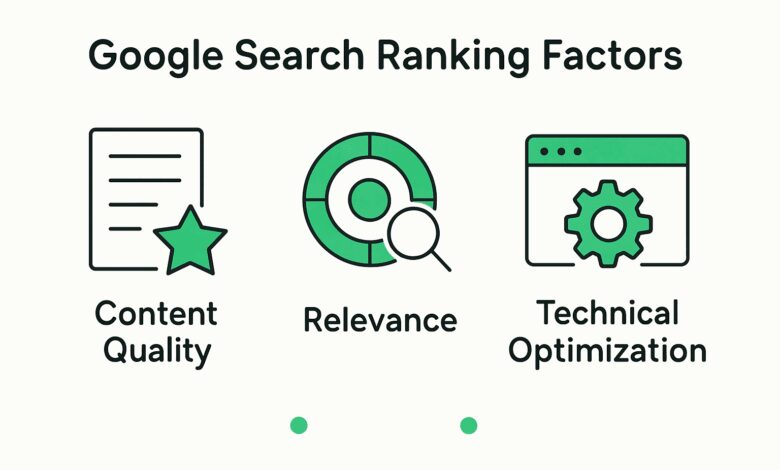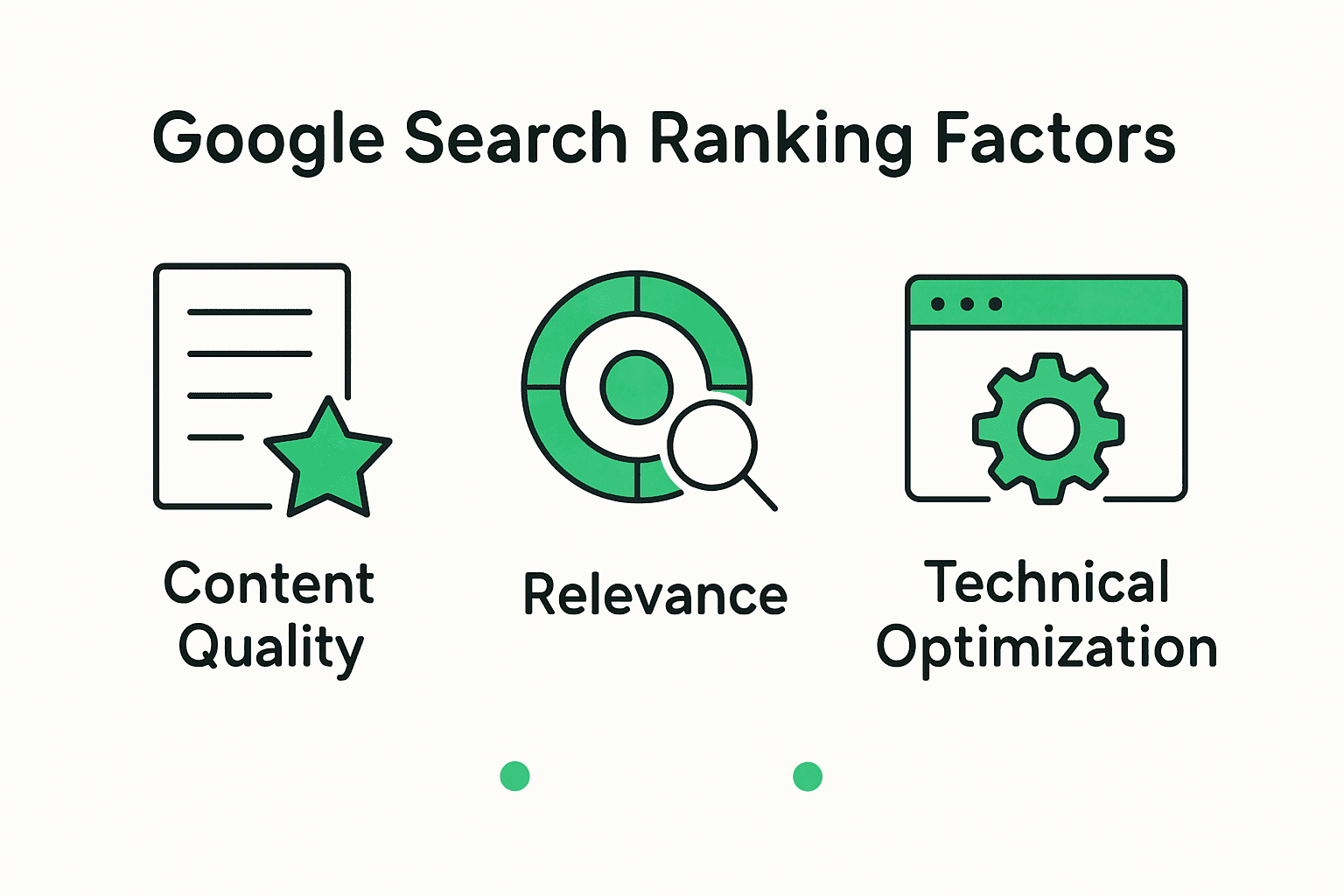Google Search Ranking Factors 2025: Guide for Small Businesses

Google’s search algorithm is more complicated than ever and small businesses are scrambling to keep up with the changes. You might think success is all about stuffing in keywords or posting endlessly on social media. But the stats tell another story. Over 70% of Google searches now rely on AI-driven algorithms that reward real expertise, content quality, and technical performance over old-school tricks. That flips the script on everything most people assume about ranking in 2025 and opens new doors for businesses who are ready to adapt.
Quick Summary
| Takeaway | Explanation |
|---|---|
| Content quality drives rankings | High-quality, relevant content is essential for SEO success and should address user intent thoroughly. |
| Optimize your Google Business Profile | A complete and active Google Business Profile enhances local search visibility and engagement with potential customers. |
| Focus on technical optimization | Ensure your website is fast, mobile-friendly, and secure to improve user experience and search rankings. |
| User engagement is crucial | Metrics like time on page and bounce rate are now key indicators of content relevance and quality. |
| Avoid common SEO myths | Understand that user experience and content relevance are more important than keyword density or social media engagement for rankings. |
What Are Google Search Ranking Factors

Understanding Google search ranking factors is crucial for small businesses looking to improve their online visibility. Google uses a complex algorithm with hundreds of signals to determine how websites rank in search results. These ranking factors help the search engine deliver the most relevant and high-quality content to users.
Core Components of Search Rankings
At its foundation, Google’s ranking system evaluates websites through multiple critical dimensions. Learn more about advanced SEO strategies to understand how these factors work together. Content quality remains the primary driver of search rankings. According to research analyzing over 67,000 keywords, search engine results pages (SERPs) are heavily influenced by the depth, relevance, and user engagement of content.
The algorithm considers several key elements when determining a website’s position. Content relevance tops the list, meaning how well your content matches user search intent. This goes beyond simple keyword matching. Google’s sophisticated systems analyze the comprehensive context of your content, looking for in-depth information that genuinely addresses user questions.
Evolving Ranking Signals
Google’s ranking approach has become increasingly nuanced. According to Google’s own guidelines, the company prioritizes what they call E-E-A-T signals: Experience, Expertise, Authoritativeness, and Trustworthiness. For small businesses, this means demonstrating genuine knowledge and credibility within your specific domain.
Technical factors play an equally important role. Website speed, mobile responsiveness, secure connections (HTTPS), and clean site architecture significantly impact search rankings. Google wants to ensure users have a smooth, safe browsing experience. Small businesses must invest in technical optimization to compete effectively in search results.
Backlink quality remains a critical ranking factor, though its importance has evolved. Gone are the days when any link would boost rankings. Modern search algorithms scrutinize the relevance, authority, and context of linking domains. A single high-quality, contextually relevant backlink can be more valuable than dozens of low-quality links.
User experience metrics have gained tremendous weight in recent years. Search engines now track how users interact with your content. Metrics like time on page, bounce rate, and click-through rate provide direct feedback about your content’s quality and relevance. Small businesses must create engaging, informative content that keeps visitors interested and encourages them to explore further.
Navigating these ranking factors requires a holistic approach. No single strategy guarantees top search positions. Instead, small businesses must develop comprehensive digital strategies that address content quality, technical performance, user experience, and genuine expertise in their field.
Here’s a summary table comparing the core Google ranking factors for 2025 and their primary impact areas, to help small businesses understand what matters most:
| Ranking Factor | Description | Primary Impact |
|---|---|---|
| Content Quality & Relevance | In-depth, relevant content that satisfies user intent | Visibility & Authority |
| E-E-A-T (Experience, Expertise, Authoritativeness, Trustworthiness) | Demonstrates expertise and credibility | Trust & Rankings |
| Technical Optimization | Fast, mobile-friendly, secure websites | User Experience |
| Backlink Quality | High-quality, relevant, authoritative links | Authority & Signals |
| User Engagement Metrics | Time on page, bounce rate, click-throughs | Content Relevance |
Top 2025 Ranking Factors for Local Businesses
Local businesses face a unique challenge in search rankings, requiring specialized strategies to stand out in increasingly competitive digital landscapes. As search algorithms become more sophisticated, understanding the most critical ranking factors for local search has never been more important.
Google Business Profile Optimization
Your Google Business Profile represents the cornerstone of local search visibility. According to First Page Sage’s 2025 analysis, key ranking factors now include a blend of content quality, keyword optimization, and user engagement. For local businesses, this means creating a comprehensive and dynamic Google Business Profile that goes beyond basic contact information.
Profile Completeness is critical. Every section matters. High-quality photos, accurate business hours, detailed service descriptions, and regular updates signal to Google that your business is active and relevant. Local businesses should aim to provide the most comprehensive and current information possible, including specialized services, unique selling points, and up-to-date contact details.
To help clarify what to focus on, here is a checklist table of essential Google Business Profile elements that affect local rankings:
| Profile Element | Required for Ranking | Recommended Action |
|---|---|---|
| Business Name | Yes | Use official, consistent name |
| Address & Phone Number | Yes | Ensure accuracy and consistency |
| Business Hours | Yes | Regularly update, reflect changes |
| Service Descriptions | Yes | Detail all services clearly |
| High-Quality Photos | Yes | Upload regularly, showcase work |
| Reviews & Responses | Yes | Encourage, monitor, respond |
| Updates/Posts | No | Post offers/events routinely |
Local Content and Relevance Signals
Content remains king in local search rankings. According to Google’s official guidelines, relevance is one of the primary factors determining local search positioning. This means creating hyper-local content that speaks directly to your community and target audience. Blog posts about local events, neighborhood-specific services, and region-specific insights can significantly boost your local search visibility.
User engagement metrics have gained tremendous weight. Search engines now track how local users interact with your online presence. Metrics like click-through rates, time spent on your website, and user reviews provide direct feedback about your business’s relevance and quality. Encouraging customer reviews, responding promptly to feedback, and maintaining an active online presence are no longer optional but essential strategies.
Technical and Behavioral Ranking Factors

Technical optimization continues to play a crucial role in local search rankings. Research from WSI highlights the importance of mobile optimization, site speed, and secure connections. Local businesses must ensure their websites are fast, mobile-friendly, and provide an excellent user experience across all devices.
Backlink quality remains a significant ranking factor, with a growing emphasis on local and industry-relevant links. A single high-quality backlink from a local news site, chamber of commerce, or respected industry publication can be more valuable than numerous low-quality links. Small businesses should focus on building genuine, meaningful connections within their local ecosystem.
The most successful local businesses in 2025 will approach search rankings holistically. This means integrating technical optimization, content strategy, user experience, and genuine local engagement. No single tactic guarantees top rankings. Instead, businesses must develop a comprehensive digital strategy that demonstrates authentic local expertise and delivers real value to their community.
Practical SEO Tips for Service Providers
Service providers operate in a highly competitive digital landscape where strategic SEO can make the difference between visibility and obscurity. Understanding and implementing targeted SEO strategies is crucial for attracting potential clients and establishing online credibility.
Content Strategy for Service-Based Businesses
According to Search Engine Land, creating comprehensive content experiences that demonstrate expertise is paramount. Topical authority becomes the cornerstone of effective SEO for service providers. This means developing deep, interconnected content that thoroughly addresses your potential clients’ questions and pain points.Developing cornerstone content requires a strategic approach. Focus on creating in-depth guides that showcase your professional expertise. Each piece of content should not just answer surface-level questions but provide genuine insights that demonstrate your unique value proposition. Include specific examples, case studies, and actionable advice that potential clients can immediately understand and appreciate.
Technical Optimization and User Experience
Research from Goozmo emphasizes the critical importance of user experience in search rankings. Core Web Vitals now play a significant role in determining search visibility. Service providers must prioritize website performance, ensuring fast loading times, mobile responsiveness, and intuitive navigation.Technical SEO goes beyond simple website speed. Implement schema markup to help search engines understand your services more precisely. Create clear, descriptive meta titles and descriptions that not only include relevant keywords but also compellingly communicate your unique service offerings. Structured data can significantly improve your visibility in search results, helping potential clients find you more easily.
Adapting to AI-Powered Search Dynamics
According to NF Forgings, 70% of Google searches now involve AI-driven algorithms that prioritize conversational, user-friendly content. This shift requires service providers to reimagine their content strategy. Write in a natural, conversational tone that addresses search intent directly. Develop content that answers specific questions potential clients might ask, incorporating FAQ sections and concise, clear explanations.Voice search optimization is becoming increasingly important. People often use conversational queries when searching for services, so your content should reflect this natural language approach. Think about the questions your clients actually ask and structure your content to provide direct, comprehensive answers.
Successful SEO for service providers in 2025 requires a holistic approach. It’s not just about ranking higher but about creating genuine value for potential clients. Combine technical optimization, high-quality content, and a deep understanding of your target audience’s needs. By focusing on providing real solutions and demonstrating expertise, service providers can build a strong online presence that attracts and converts potential clients.
Common Myths About Google Rankings Debunked
Misconceptions about Google search rankings can lead small businesses down ineffective marketing paths. Understanding the truth behind these myths is crucial for developing a strategic, evidence-based approach to online visibility.
Keyword Density and Content Length Myths
According to Simplilearn, the persistent myth that longer content or excessive keyword stuffing guarantees higher rankings is fundamentally flawed. Content quality trumps quantity every time. Modern search algorithms prioritize comprehensive, relevant content that genuinely addresses user intent over arbitrary word counts or keyword repetition.Businesses often mistakenly believe that cramming multiple keywords into content will boost rankings. In reality, Google’s sophisticated algorithms recognize natural, contextually relevant writing. The focus should be on creating informative, engaging content that provides real value to readers. Keyword optimization is important, but it must be strategic and organic, seamlessly integrated into well-structured, meaningful text.
Marketing Channels and Ranking Misconceptions
Research from Entrepreneur reveals several critical misconceptions about marketing channels and search rankings. One prevalent myth is that social media engagement directly influences search rankings. While social media can drive traffic and increase brand visibility, Google does not use social signals as direct ranking factors.Similarly, Search Engine Journal debunks the myth that pay-per-click (PPC) advertising improves organic search rankings. These are entirely separate systems. Running paid search campaigns does not provide a direct boost to organic search positions. Small businesses should view PPC and organic search as complementary strategies, each with unique benefits, rather than expecting one to magically improve the other.
Technical SEO and Ranking Oversimplifications
Many small businesses fall prey to oversimplified technical SEO myths. Some believe that a single technical fix will dramatically improve search rankings overnight. The reality is far more nuanced. Search ranking is a complex ecosystem involving multiple interconnected factors. While technical optimization is crucial, it’s just one piece of a comprehensive SEO strategy.
Another common misconception is that backlinks are the ultimate ranking solution. While high-quality, relevant backlinks remain important, their impact has evolved. Google now emphasizes the context, relevance, and authority of linking domains. A few high-quality, contextually relevant backlinks can be more valuable than numerous low-quality links.
Successful SEO in 2025 requires a holistic, informed approach. Small businesses must look beyond myths and focus on creating genuine value for their audience. This means developing high-quality content, maintaining a technically sound website, understanding user intent, and continuously adapting to evolving search algorithms. The most effective SEO strategy is one that prioritizes user experience and provides real, meaningful solutions to potential customers’ needs.
Frequently Asked Questions
What are the main Google search ranking factors for small businesses in 2025?
Content quality, E-E-A-T (Experience, Expertise, Authoritativeness, Trustworthiness), technical optimization, backlink quality, and user engagement metrics are the primary ranking factors for small businesses in 2025.
How can I optimize my Google Business Profile for better local search rankings?
To optimize your Google Business Profile, ensure it is complete with accurate business information, high-quality photos, detailed service descriptions, and regular updates to reflect current offerings.
What role does user engagement play in search rankings?
User engagement metrics such as time on page, bounce rate, and click-through rate are increasingly important, as they indicate the relevance and quality of your content to visitors.
Are backlinks still relevant for SEO in 2025?
Yes, backlinks remain relevant, but quality over quantity is key. A few high-quality, contextually relevant backlinks from authoritative sources are more beneficial than many low-quality links.




